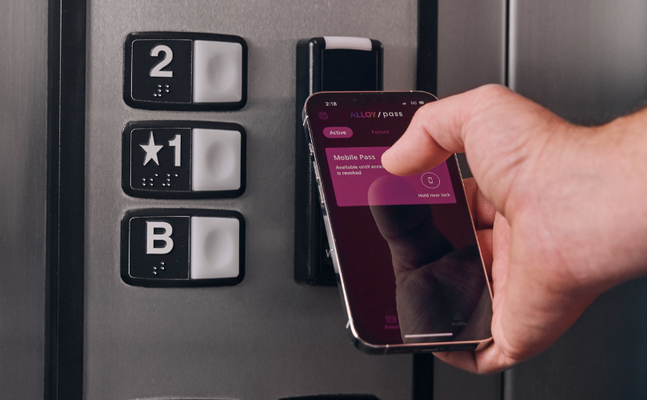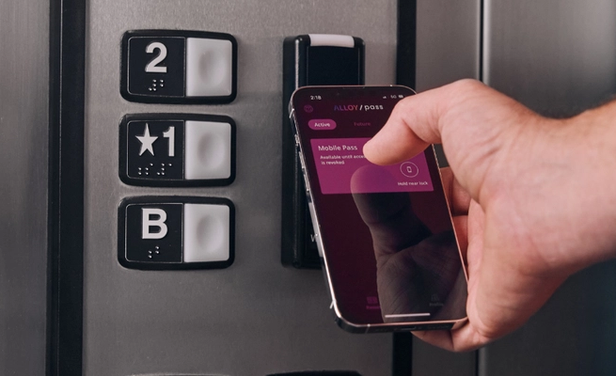Imagine searching for a rental apartment 30 years ago. Forget online listings or instant applications. Back then, your hunt involved trolling newspaper ads, scanning community boards and driving around neighborhoods searching for “For Rent” signs.
Fast-forward to today, and the rental search is a streamlined, tech-driven experience. Online marketplaces feature communities with detailed descriptions, photos, and even 3D virtual tours. You can schedule tours with just a few clicks, fill out applications electronically, and even sign your lease — all from the palm of your hand.
This dramatic shift highlights the rise of proptech, or property technology, a $27 billion industry that uses advanced technology to remake every aspect of the real estate market, from searching for a rental to managing entire portfolios.
What exactly does proptech embrace? It’s a vast umbrella that includes online platforms, digital tools and real estate-specific software solutions. These tools empower everyone involved in real estate - buyers, renters, investors and property managers.
Since the early days of the Internet, proptech has seen steady invention. Let’s explore this exciting evolution and see how proptech is shaping the future of real estate.

Dawn of real estate tech: the evolution of proptech
The 1990s
The Internet revolutionized information access in the 1990s. In 1995, Netscape’s user-friendly web browser made the Internet accessible to a broader audience for the first time. This same year, a group of real estate professionals capitalized on this new technology by launching Realtor.com, the first major online real estate listing platform. The birth of Realtor.com marked the dawn of real estate technology, allowing the public to access property information and photos digitally for the first time. Additionally, during this decade, email adoption within the real estate industry simplified communications between renters, agents and property managers.
The 2000s
By the 2000s, real estate websites like Zillow and Trulia became prominent. These platforms streamlined the leasing process through electronic signatures and online applications. Additionally, personal computer software delivered centralized community management platforms for community managers, enabling basic automation tasks.
The 2010s
The 2010s witnessed the explosion of mobile property searches with the rise of smartphones and tablets. This decade also saw the introduction of virtual reality (VR) tours, allowing for a more immersive remote home viewing experience. Cloud-based community management platforms became the norm, enabling features like digital rent payments, remote community management, real-time updates, advanced automation functionalities, and data analytics for better decision-making. The mid-2010s also saw the introduction of Internet of Things (IoT) technology by proptech startups.
The 2020s
The COVID-19 pandemic in the early years of this decade significantly accelerated the adoption of proptech. Today, mobile searches dominate the real estate landscape, with a staggering 76% of homebuyers and 72% of renters using their smartphones and tablets to search for properties.
IoT smart technology is becoming increasingly commonplace. A 2024 NMHC & Grace Hill Renter Preferences Survey reveals that a third (33%) of renters already have a smart lock on their door.
At the same time, 3D virtual tours and self-guided in-person tours powered by smart lock technology allow renters to tour homes without assistance. In fact, a remarkable 27% of renters surveyed by NMHC & Grace Hill rented a home in 2024 without ever physically visiting it. The real estate industry has undeniably come a long way since the days of newspaper listings and answering machine messages. As technology continues to evolve, we can expect even more imaginative proptech solutions to emerge in the coming years.
Understanding proptech in the rental industry
Proptech uses innovative technologies like artificial intelligence (AI), blockchain, virtual and augmented reality, and the IoT to streamline workflows, enhance the renter experience, increase transparency and security, and improve data analytics. Here are some of the vital proptech technologies in the rental market and their advantages for community managers:
Online marketplaces
From Apartments.com to Zillow, online marketplaces offer renters a convenient way to find properties with a wealth of information at their fingertips. This includes detailed property descriptions, high-quality photos and videos, and immersive 3D tours that allow renters to virtually explore a property before ever stepping inside. Marketplaces also give renters a glimpse of the community features offered at each community. Many marketplaces will also incorporate reviews and ratings from previous renters, fostering transparency and trust. Finally, these platforms streamline the application process enhancing the overall user experience for renters.
The benefits:
Connect with a large pool of renters
Attract renters with ratings and reviews (79% of renters look at them according to the NMHC & Grace Hill survey)
Streamline communication and transactions for improved operational efficiency
Property management software
These cloud-based centralized platforms help property owners and managers with various tasks, consolidating everything from budgeting and accounting to listings, tours, applications and renter screenings. Property management software also streamlines rent payments, tenant communication, legal compliance adherence, inspections and maintenance requests. By integrating with other digital tools and systems, these platforms optimize project management for property managers.
The benefits:
Streamlined tasks and improved efficiency
Reduced manual work
Improved communication with renters
Track property performance and market trends
Make data-driven decisions
Smart home technology
The smart home consists of sensor-embedded IoT devices that improve the living experience. These devices include lightbulbs, security cameras, doorbells, speakers and thermostats. Their sensors monitor the environment, translate information about it into data and send this data over the Internet.
The IoT allows these devices to coordinate tasks without human help. For instance, smart thermostats learn a person’s preferences and monitor the location in real time. They use that information to automatically adjust heating and cooling. Other IoT sensors predict water leaks or humidity issues and trigger maintenance requests. IoT-enabled systems in smart buildings automatically control lighting, security and energy management.
The benefits:
An enhanced level of comfort and effortless living
Can reduce energy consumption and utility bills
Can detect potential problems like water leaks early on, preventing expensive repairs
A recent NMHC & Grace Hill survey reports 81% of renters said smart locks are important, 79% said smart thermostats are important, and 76% said video doorbells are important
Virtual and self-guided tours
Proptech offers two creative approaches to touring properties: virtual tours and self-guided tours. Virtual tours utilize specialized software and a 360-degree camera. These tours allow renters to remotely explore every angle of a home, check out amenities, view floor plans and rule out unsuitable properties, saving them valuable time. Self-guided tours use technology that automates in-person tours by combining smart locks, a mobile app and an automated scheduling system. This allows prospects to schedule and take tours at their convenience without requiring assistance from a leasing agent.
The benefits:
Both virtual and self-guided tours offer renters flexibility and control over their touring experience (64% of renters prefer virtual tours without an agent according to an Apartments.com survey, and 38% of renters have already used self-guided tours in the 2024 NMHC & Grace Hill survey)
Automated touring frees up on-site teams to focus on other tasks, potentially reducing costs and boosting operational efficiency
Data analytics
These digital tools harness big data to help with decision-making. They analyze property performance, renter behavior, energy use and market trends. This data helps property managers set competitive rents, optimize maintenance schedules and focus on essential repairs. It can also support the valuation process, helping owners accurately assess property values.
The benefits:
Boost financial performance
Enhance operational efficiency
Improve resident satisfaction
Financial technology (fintech)
Rental fintech solutions simplify financial operations. Some tools automate the collection of rent and security deposits and offer renters flexible payment options. Some solutions streamline background checks and income verification to simplify rental applications. Other solutions streamline lease tracking and accounting.
The benefits:
Simplify financial operations
Automate collections of rent and security deposits
Streamline lease tracking and accounting
Future trends in proptech
Advanced technologies, like AI, machine learning, blockchain and the IoT are constantly reshaping proptech. Here are some of the most exciting proptech trends that are poised to transform property management in the coming years:
Blockchain smart contracts
Blockchain is a secure, decentralized system for recording transactions. It makes smart contracts possible, which are essentially self-executing agreements written in code. The global market for smart contracts is accelerating, and they're likely to significantly impact the real estate sector in the coming years.
AI-powered automation
Computer programs are already taking over time-consuming tasks using AI and machine learning. For example, SmartRent’s Walk & Talk technology automatically populates work orders based on voice commands, saving maintenance technicians valuable time.
Advanced personalization
AI-powered tools can use data analytics to personalize the prospect and renter experience. Nearly three-quarters (71%) of consumers expect personalization from businesses, according to a 2021 McKinsey report. The proptech industry has significant room for growth in personalization, particularly in the rental search process. Imagine AI tools curating highly personalized property recommendations, similar to recommendations you receive from Amazon and Netflix. Property managers can use this approach to attract more prospects by offering recommendations based on search history and preferences. They’ll also likely personalize amenities, services and communications, ultimately offering a more satisfying rental experience.
Digital twin technology
Digital twins are highly detailed digital copies of physical spaces, assets or processes. The technology allows real-time updates of large amounts of data, so the digital twin closely mirrors reality.
Digital twin technology can monitor rental properties. It can help predict maintenance needs and track energy usage to improve sustainability and reduce utility costs. Community managers can use it to respond more quickly to renters’ needs and create immersive digital tours.
Digital twinning is still in the early stages of adoption in property management. The technology can potentially improve operational efficiency, boost asset management and reduce maintenance costs.
AI-powered assistants
Sophisticated chatbots and virtual assistants engage in human-like conversations. They already help property managers answer common questions, complete maintenance requests and schedule tours. With technology advancements, look for these powerful tools to further streamline operations and improve operational efficiency.
Final thoughts
In just 30 years, the proptech sector has revolutionized real estate, transforming it into a modern, tech-driven industry. Analysts predict the proptech market to experience significant growth, with a compound annual growth rate of 15.8% between 2022 and 2030.
It’s hard to predict what the next 30 years will bring to the proptech industry (it’s brimming with possibilities), but one thing is certain: community owners and managers who embrace proptech solutions will be well-positioned for success. As a leading proptech provider, SmartRent is at the forefront of this transformation, committed to shaping the future of real estate with innovative solutions.

